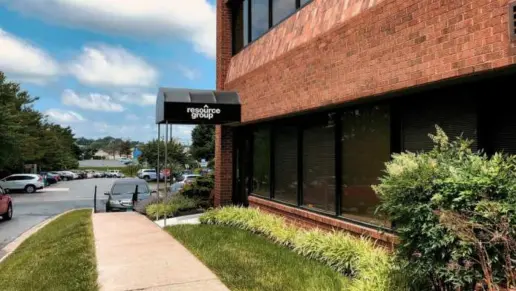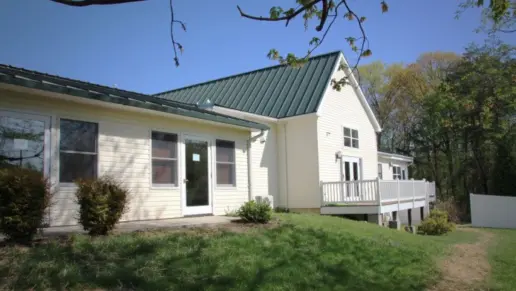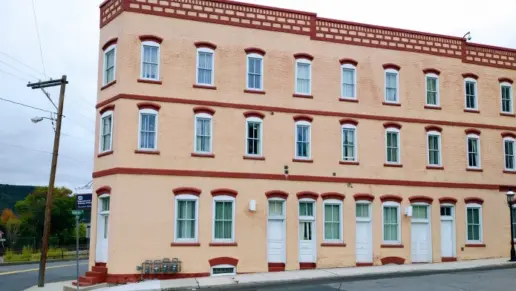I stayed inpatient here back in 2018 and the people who worked here helped shape my recovery story today. I didn't realize it then because I was fresh off the street and detoxing but today I can say with much gratitude that its the people who care and work tirelessly to help ...
About Hope House Treatment Center Laurel
Situated in Laurel, Maryland, Hope House is a drug and alcohol treatment center that supports adults with substance use disorders. They also provide valuable community resources, such as referrals, transitional housing, and mental health services.
Addiction-related services at Hope House include mental health assessments, counseling, detox, residential addiction treatment, outpatient medication-assisted treatment, and peer support services.
Mental Health Assessment and Counseling
Assessments help counselors to evaluate participants’ mental health for substance use disorder, the severity, and any co-occurring conditions. The information is used to create an individualized treatment plan, which may involve individual, group, and family counseling.
Outpatient Detox
Outpatient detox helps to alleviate painful withdrawal symptoms using FDA-approved medications. Along with managing withdrawal symptoms, clients benefit from recovery education classes and peer support programs.
Inpatient Substance Use Disorder Treatment
Residential addiction treatment programs rely on evidence-based practices to treat addiction and mental health conditions. Hope House offers programs for adults over 18 and each patient receives a comprehensive assessment and individualized treatment plan.
Medication-Assisted Treatment for Addiction
The medication-assisted treatment (MAT) rehab program at Hope House includes counseling, support groups, and medication management in an outpatient setting. Hope House can treat alcohol and opioid addictions using MAT.
Peer Support Program
The peer support program is offered by individuals with lived experience of addiction and recovery. Trained and certified by the state, peers support individuals seeking recovery. They can provide a recovery plan and assist them in navigating services and achieving their goals.
Latest Reviews
Rehab Score
Gallery
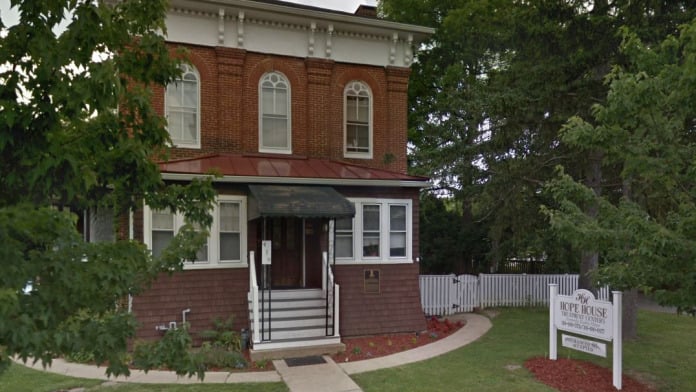
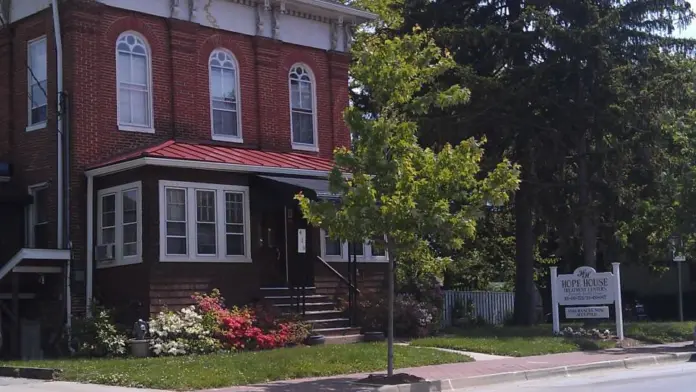
Location
Accepted Insurance



Other Forms of Payment
Private insurance refers to any kind of healthcare coverage that isn't from the state or federal government. This includes individual and family plans offered by an employer or purchased from the Insurance Marketplace. Every plan will have different requirements and out of pocket costs so be sure to get the full details before you start treatment.
Self-pay involves paying for treatment out of your own pocket. You can use savings or credit, get a personal loan, or receive help from family and friends to fund your treatment. If you don't have insurance or your insurance plan doesn't cover a specific program, self-pay can help ensure you still get the care you need.
Financial aid can take many forms. Centers may have grants or scholarships available to clients who meet eligibility requirements. Programs that receive SAMHSA grants may have financial aid available for those who need treatment as well. Grants and scholarships can help you pai for treatment without having to repay.
Military members, veterans, and eligible dependents have access to specific insurance programs that help them get the care they need. TRICARE and VA insurance can help you access low cost or no cost addiction and mental health treatment. Programs that accept military insurance often have targeted treatment focused on the unique challenges military members, veterans, and their families face.
Medicaid is a state based program that helps lower-income individuals and families pay for healthcare. Medicaid covers addiction treatment so those enrolled can use their coverage to pay for rehab. When a program accepts Medicaid the client often pays very little or nothing out of their own pocket.
Addiction Treatments
Levels of Care
Treatments
The goal of treatment for alcoholism is abstinence. Those with poor social support, poor motivation, or psychiatric disorders tend to relapse within a few years of treatment. For these people, success is measured by longer periods of abstinence, reduced use of alcohol, better health, and improved social functioning. Recovery and Maintenance are usually based on 12 step programs and AA meetings.
Once a person has become addicted to a substance, drug rehab in Maryland is often necessary to overcome that addiction. These programs provide the tools individuals need to manage the physical, mental, and emotional issues involved and begin a successful recovery journey.
Many of those suffering from addiction also suffer from mental or emotional illnesses like schizophrenia, bipolar disorder, depression, or anxiety disorders. Rehab and other substance abuse facilities treating those with a dual diagnosis or co-occurring disorder administer psychiatric treatment to address the person's mental health issue in addition to drug and alcohol rehabilitation.
A combined mental health and substance abuse rehab has the staff and resources available to handle individuals with both mental health and substance abuse issues. It can be challenging to determine where a specific symptom stems from (a mental health issue or an issue related to substance abuse), so mental health and substance abuse professionals are helpful in detangling symptoms and keeping treatment on track.
Opioid rehabs specialize in supporting those recovering from opioid addiction. They treat those suffering from addiction to illegal opioids like heroin, as well as prescription drugs like oxycodone. These centers typically combine both physical as well as mental and emotional support to help stop addiction. Physical support often includes medical detox and subsequent medical support (including medication), and mental support includes in-depth therapy to address the underlying causes of addiction.
Programs




Clinical Services
Cognitive Behavioral Therapy (CBT) is a therapy modality that focuses on the relationship between one's thoughts, feelings, and behaviors. It is used to establish and allow for healthy responses to thoughts and feelings (instead of unhealthy responses, like using drugs or alcohol). CBT has been proven effective for recovering addicts of all kinds, and is used to strengthen a patient's own self-awareness and ability to self-regulate. CBT allows individuals to monitor their own emotional state, become more adept at communicating with others, and manage stress without needing to engage in substance abuse.
Group therapy is any therapeutic work that happens in a group (not one-on-one). There are a number of different group therapy modalities, including support groups, experiential therapy, psycho-education, and more. Group therapy involves treatment as well as processing interaction between group members.
In individual therapy, a patient meets one-on-one with a trained psychologist or counselor. Therapy is a pivotal part of effective substance abuse treatment, as it often covers root causes of addiction, including challenges faced by the patient in their social, family, and work/school life.
Four key principles guide motivational interviewing. These are empathy, self efficacy, rolling with resistance, and developing discrepancy. These techniques allow the client to examine their motivations for change, identify discrepancies in their current situation and future goals, and feel empowered to make changes to reach their goals.
The focus of trauma therapy is to heal the emotional wounds that occurred when you witnessed or experienced a traumatic event. Therapy helps you process this trauma emotionally and mentally so you develop healthier coping skills and improve your quality of life.
Research clearly demonstrates that recovery is far more successful and sustainable when loved ones like family members participate in rehab and substance abuse treatment. Genetic factors may be at play when it comes to drug and alcohol addiction, as well as mental health issues. Family dynamics often play a critical role in addiction triggers, and if properly educated, family members can be a strong source of support when it comes to rehabilitation. Hope House provides weekly family meetings led by a member of the professional counseling staff. Family counseling is a chance to rebuild trust and re-establish bonds between family members that existed before drug addiction entered their lives. Weekly sessions provide a chance for parents, siblings and children to speak their minds. This may be the first time that family members have addressed the individual directly about their addiction and can help open the lines of communication. These sessions are a chance for a counselor to instruct the family on the best, most productive ways to help their loved one make a smooth transition back into normal life following treatment.
If you want to quit smoking, discuss the options of nicotine replacement therapy (NRT) with your doctor. These products are safe for most adults except pregnant women. Your doctor can help you consider the benefits and decide which type of NRT is best for you.
Amenities
-
Yoga Studio
-
Residential Setting
-
Private Rooms
Staff & Accreditations
Staff
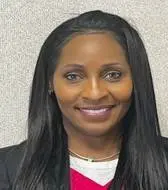
CEO

Medical Director
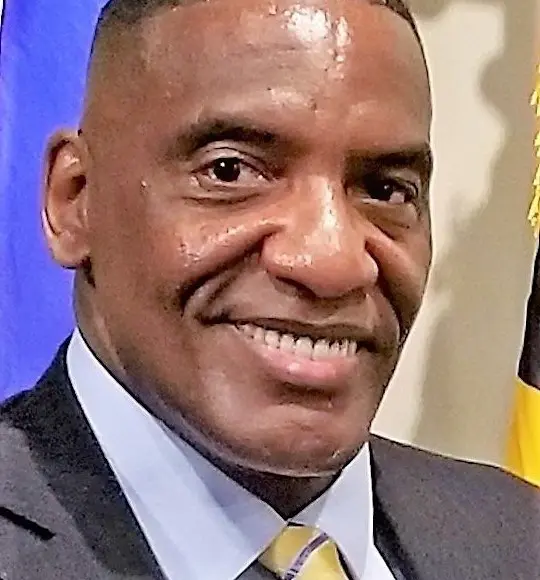
Director of Treatment
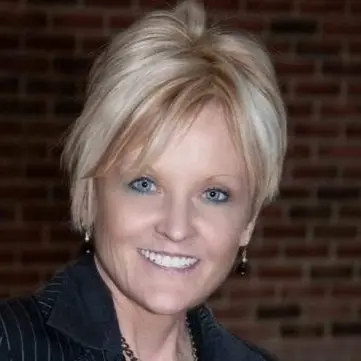
Chief Strategy and Engagement Officer
Accreditations

The Commission on Accreditation of Rehabilitation Facilities (CARF) is a non-profit organization that specifically accredits rehab organizations. Founded in 1966, CARF's, mission is to help service providers like rehab facilities maintain high standards of care.
CARF Accreditation: Yes
Accreditation Number: 239638
Contact Information
429 Main Street
Laurel, MD 20707






